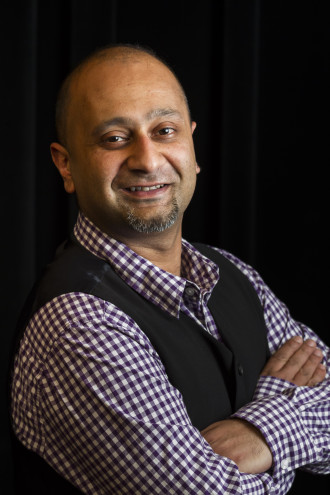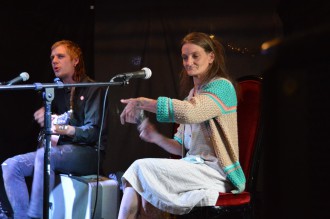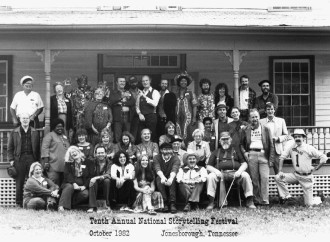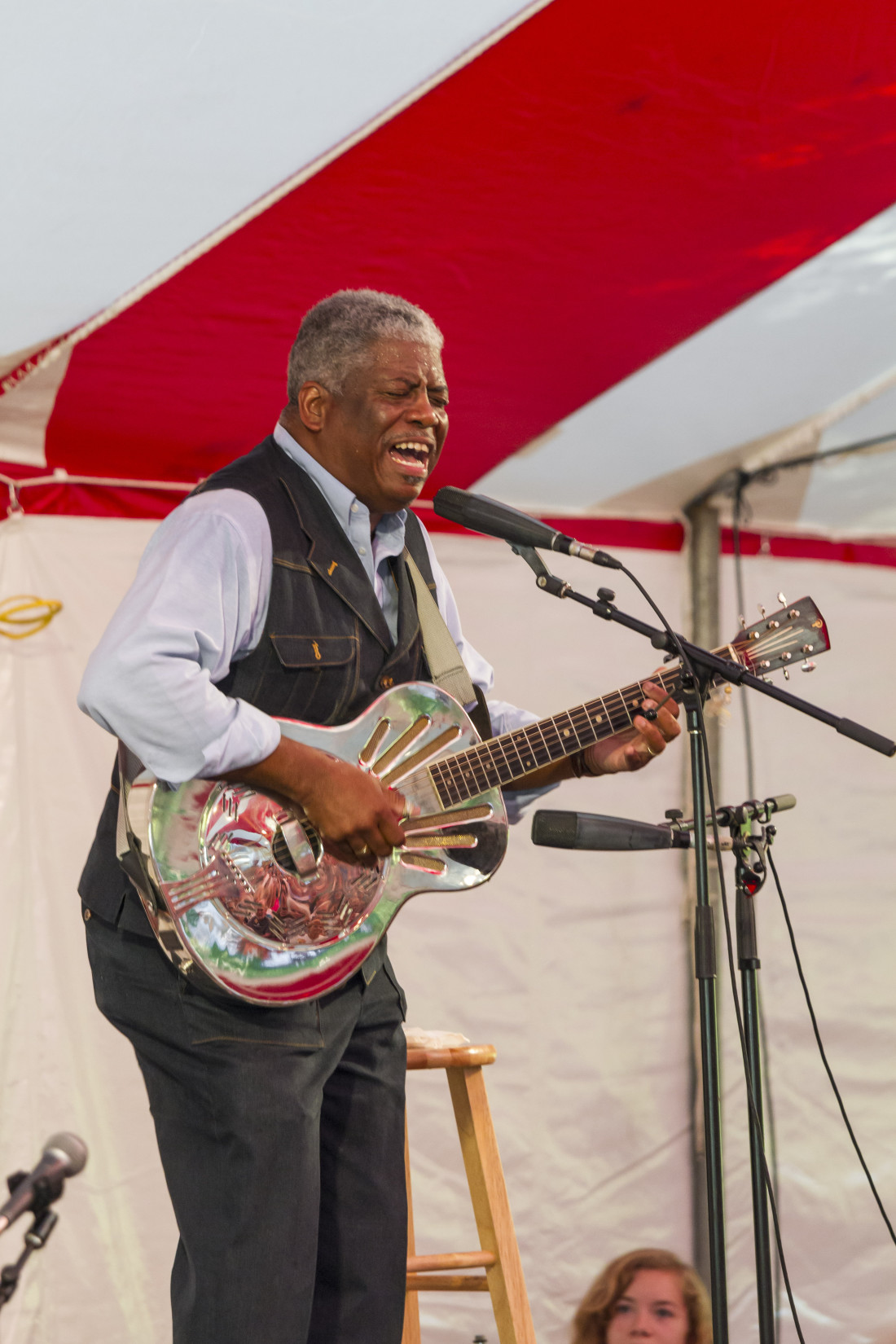For decades the road between Asheville and Jonesborough, Tenn., was a hard one. It was a pretty route, skirting farmland and winding up and down wooded mountains, but it was two lanes much of the way, and it wasn’t a road drivers could take in a hurry. Even as recently as the turn of the millennium, Interstate-26 only went so far into Madison County. And then the highway ended, and travelers were plunged into rural switchbacks — roads that followed the natural lines of the mountains rather than blasting through them.
Today there’s a modern interstate — a literal high road — across “the mountain.” To some there may still be a psychological divide between the two regions, but it’s an easy drive today, one David Joe Miller can make in an hour and 15 minutes, he says. “It was a long, winding road, and I think people still have that mindset,” Miller says. “We use that terminology: ‘over the mountain.'” Yet Western North Carolina and Eastern Tennessee have plenty in common: geography, cultural history and long-standing traditions of storytelling.
Miller is, after all, a storyteller. He’s practiced the time-honored craft both in his native Jonesborough and in Asheville, where he lives today. He’s the executive director of Stories on Asheville’s Front Porch and the producer of Black Box Storytelling Theater, which takes place Monday evenings at New Mountain. And the relatively recent highway has already served as a conduit, bringing members of Jonesborough’s renowned storyteller community to perform in Asheville.
Routes of connection
“I founded the Jonesborough Storytelling Guild in 1994,” Miller says. He’s invited members of the guild to his events in Asheville, and they’ve made the trip. Saundra Kelley, the former president of the guild, traveled to one of Miller’s open mics, where she told a classic tale. At that same open mic there was a comedian ranting about politics, a gay hippie couple telling a story together and personal tales by people of varying ages. Miller loves the variety; it’s what he wants. And he loves to see people come together over that oldest of art forms, the story.
“We are recognizing storytelling as something that permeates all the different disciplines — across dance, across performing arts, visual arts, journalism — and all the ways people interact with one another,” says Kiran Sirah, executive director of the International Storytelling Center in Jonesborough. “It crosses all borders and divisions: ethnicity, race, gender, sexuality.”

Stories are powerful. Stories are everywhere. And the storytelling movement is evolving to accept and incorporate everything from ancient folklore and traditional tales to modern personal narratives and slam poetry. The Asheville-Jonesborough corridor, with its mix of tradition and progressiveness, seems like a natural hub for that evolution. The first International Storytelling Festival was in Jonesborough in 1973, and the small Tennessee town quickly became a nexus for the storytelling community. And Sirah, who has headed the festival since 2013, is actively working to ensure everyone’s stories are welcome.
After all, he knows what it means to be marginalized, and he knows what it’s like to have nothing but the clothes on his back and the stories in his head. “Without storytelling, I don’t know if I would be where I am today,” Sirah says. “My family were political refugees who came from Uganda and were expelled from the country.” They couldn’t bring their personal possessions with them to southern England, where they took asylum, but they did bring hundreds of years worth of narratives, which they passed on to Sirah.
Stories became his life. Sirah has worked with marginalized high school students, with gang members and with conflict-wracked communities in Northern Ireland, Colombia, Palestine and Israel. And when he first came to the U.S. four years ago, he worked with the homeless community in central North Carolina.
“I’m a person of color, I’m not a citizen of this country, but I’m an advocate of how stories can be told and can be used in that way, to empower communities to tell their own stories,” Sirah says. “It’s one of the most powerful vehicles, particularly for people who live on the fringes, on the margins of society.”
When people gather and tell their stories, Sirah says, they realize how much they have in common, even if they were raised to see each other as incompatibly different. This is the dialogic process, and Sirah explains it in terms of strangers meeting at a bar. One may be a construction worker and one may be a bank manager, yet sitting down and swapping stories makes them equals.
“If you imagine what can happen between two people, it can happen between nations,” Sirah says.
New voices

“There’s an old folk tale about two people who are walking by a person who is farming, and the person has on a red hat on one side and a green hat on the other,” says traditional storyteller Sherry Lovett, who lives in the rural mountain town of Little Switzerland. “They walk by, and each person only sees one half of the hat.” Long story short, the two friends get into a massive argument over whether the hat is red or green, and it ruins their friendship. When they see the farmer again, Lovett says, they each see the whole hat and realize their fight was foolish and unnecessary.
Traditional tales can contain the same truth as personal stories and can serve the same peacemaking purpose as Sirah’s tales. Many traditional stories, Miller points out, originated as personal stories. The first teller and events surrounding the anecdote have been lost to time, yet the tale itself survives. Some, Sirah points out, are tens of thousands of years old. Linguists and geologists in Australia, he notes, used an ancient aboriginal tale to locate vanished islands in what is now an urban area.
Yet a modern movement, one exemplified by StoryCorps or the Moth’s StorySLAM, privileges the personal narrative. Todd Lester produces the Asheville Synergy Story Slam at The Odditorium as well as an open mic night the fourth Wednesday of the month at Hendersonville’s Black Bear Coffee Co. Folklore doesn’t speak to him — he’s too pragmatic for fantasy, as he puts it — but many of the themes he uses for his Synergy open mics turn up in many forms of storytelling.
“There are some common threads — themes of crime and punishment, of first times, of madness,” Lester says. “These are themes you find in any group of people.” Indeed, as Miller puts it, personal tales often hinge on the same archetypes that traditional stories do. “You can see the trickster, you can certainly see the villain and the hero,” he says. “You can pick all of this out. It’s almost impossible to get away from that.”
Still, traditional mountain tales are inextricably tied to this region. People not originally from WNC or Eastern Tennessee may not get it or appreciate it, which seems natural enough. Lester, for example, is from Long Island, and he was raised hearing his mother’s stories about growing up in an old ethnic neighborhood in Buffalo, N.Y. People from elsewhere in the nation or in the world may find even less in common with mountain tales.
“We’re global, so we’re hearing stories from all over the place,” Lester says. Bring in modern digital connectivity, and people are saturated with tales from all over the world, Sirah says. And in the age of social media, there are few secrets.
“People are completely willing to tell you anything about themselves,” Lester says. “People are willing to share everything.” What he likes about modern storytelling is that it puts boundaries and parameters on this confessional urge, turning it into an art form.
Two roads converge

The new highway between Asheville and Jonesborough is fast, comfortable and modern. One can stop at its overlook, for instance, and take in the grandeur of the time-worn mountain range straddling the North Carolina/Tennessee border. Or one can take the old road if he or she chooses — it’s still there — and get a closer look at the shady hollows and tumbling mountain creeks. In storytelling, too, there’s the contemporary route and the traditional one. Some aficionados hew stubbornly to just one or the other, yet storytelling’s future may hinge on a compromise between the two.
“You’ve got a lot of dyed-in-the-wool traditionalists, and they’re going to stick with that traditional story no matter what,” Miller says. Thanks to leaders like Sirah, though, even the originally tradition-heavy International Storytelling Festival is moving to include slam poetry and buskers. They have worthy stories too, Sirah and Miller say, and Miller feels bringing in such younger voices is essential to preserving the Jonesborough movement.
“You look out at the national festivals and you see a lot of gray hair, and that’s something that needs to be addressed,” Miller says. “I think with Kiran at the helm now, you’re going to see a lot of things change. I think that’s not going to be a problem with the national festival. Here, locally, it’s to each his own.” To survive, Miller feels traditional storytellers will need to appeal to modern audiences.
Yet Sirah’s time-tested method, the one he has used to get gang members to sit down and talk with each other, involves encouraging two opposing sides to recognize they’re not all that different. Modern personal narratives and traditional storytelling may not be that different, either. Sirah includes both in his festival, after all. Like the old road from Asheville to Jonesborough and the new one, both ultimately arrive at the same place.




What a shame that Corbin did not research this topic further. There is no mention of Stories on Asheville’s Front Porch which was founded six years ago to further the storytelling tradition in WNC and has successfully given birth to now seven produced storytelling venues. The popular Listen to This with Tom Chalmers at 35 Below, The Grace Presbyterian True stories told Live in the Moth tradition at Avenue M, The Asheville Storytelling Circle, Storytelling classes and Performance at Olli, Magnetic Field Story Slams, and others make Asheville a leading contender of Storytelling with the Do Tell Festival in Hendersonville. The Porch brings together all the voices of Asheville to hear each others stories, building community and celebrating life. Started by Leadership Asheville 23 is has fostered storytelling among the younger generation who are now leading storytellers in the area as well. May the stories never die.
Thanks for the history! Is this the same as NSN? Our Grand Rapids Guild, grStorySpinners.org, has been a member for many years.
Thanks for this article! I have a question: what is that “old road” to Jonesboro you mentioned? I’d love to drive it…